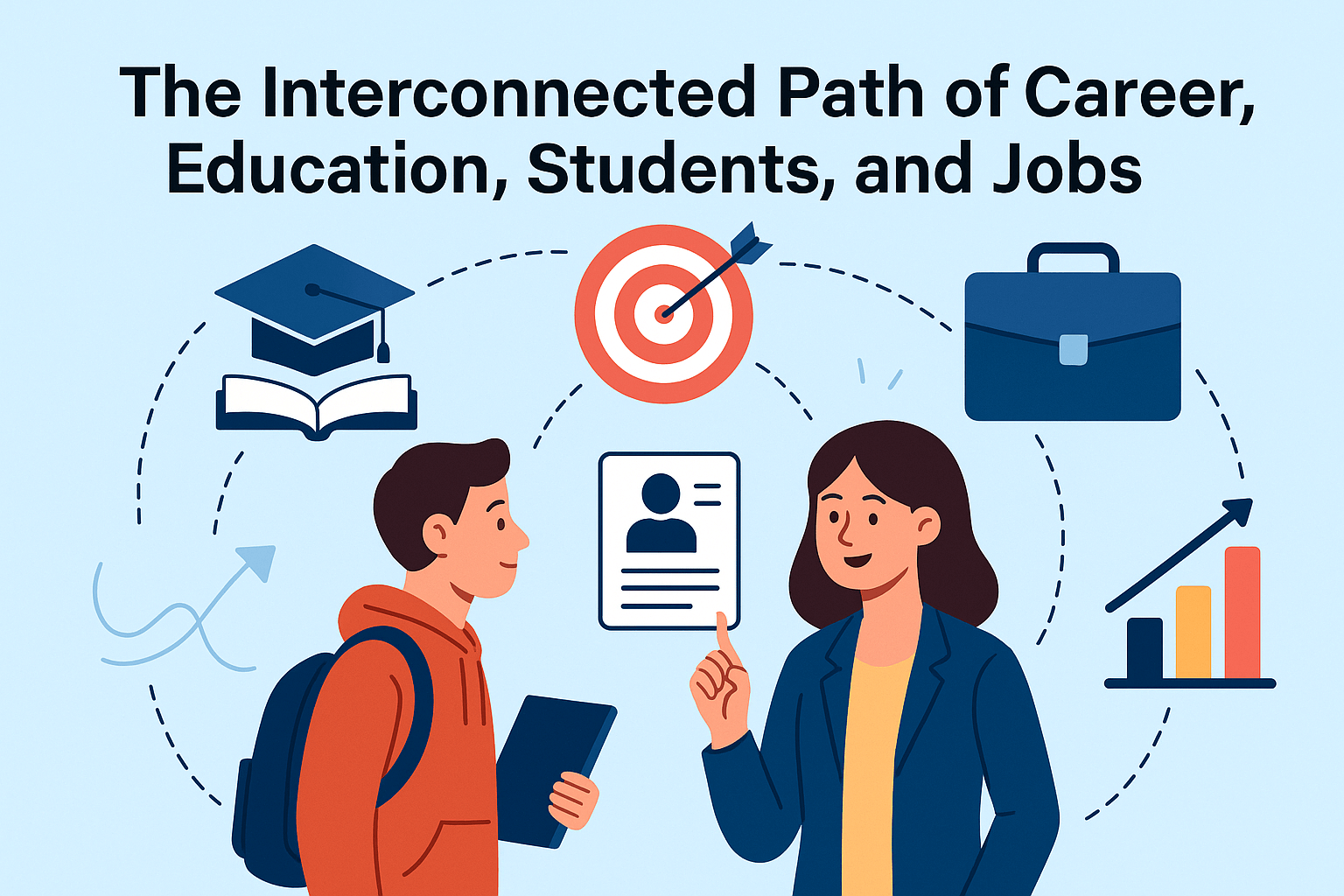Career guidance plays a vital role in shaping a person’s professional future. Whether you’re a student finishing school, a recent graduate, or someone considering a career change, understanding your options can make a significant difference. Choosing a path without proper direction can lead to frustration, low job satisfaction, and financial instability. On the other hand, thoughtful planning supported by professional advice can help align your interests with job opportunities, market needs, and long-term goals.
In this article, we’ll walk through what career guidance truly means, why it matters, who needs it, when to seek it, and how you can benefit from it at different stages of life.
What Is Career Guidance?
Career guidance refers to the support given to individuals to help them make informed decisions about their educational and professional journey. It may include assessing your interests and abilities, exploring available opportunities, and making strategic plans based on skills, market trends, and personal aspirations.
It’s more than choosing a job title. It involves understanding the work environment, salary expectations, required qualifications, future growth, and how a role aligns with your personality and values.
Key Takeaway
Career guidance is about making informed decisions by understanding yourself and the job market. It helps you select a role that suits your interests, capabilities, and long-term objectives.
Read more:- Banking Career Guide
Why Is Career Guidance Important?
In a world where career options grow each year, students and professionals often feel overwhelmed by choices. Some follow the crowd, others chase high-paying roles without clarity, and many struggle in jobs they dislike.
Career guidance acts as a compass. It prevents wrong turns and helps individuals:
-
Identify strengths and interests
-
Understand industry requirements
-
Choose relevant education or training
-
Set achievable goals
-
Build confidence in decision-making
Without proper direction, one may invest time and money into degrees or courses that don’t match their goals or job prospects.
Key Takeaway
Career guidance prevents missteps by aligning your interests with career choices. It helps avoid regret and wasted efforts, giving you a clear path based on informed and personalised decisions.
When Should You Seek Career Guidance?
There’s no fixed age or phase for seeking career advice. However, these stages are ideal:
1. After Class 10 or 12
When students must choose streams like science, commerce, or arts, early support can save years of confusion.
2. During Graduation
Selecting the right specialisation, internship, or project can benefit long-term planning.
3. After Graduation
Freshers often struggle with resumes, job interviews, or postgraduate options. A well-informed mentor can guide them through.
4. During Job Changes
Professionals who feel stuck or want to shift careers benefit from expert insights and updated skill advice.
5. Before Starting a Business
Aspiring entrepreneurs often need help evaluating risks, funding options, and market fit.
Key Takeaway
You can seek career guidance at multiple points in life—during school, college, job changes, or entrepreneurial ventures. Each phase brings its own challenges, and timely advice makes the path clearer.
Read more:- PCM Career Options
Who Can Provide Career Guidance?
Not everyone giving advice is qualified to offer useful insights. While family and friends can offer moral support, career decisions require professional input. Here’s who to consider:
-
Career counsellors: Certified professionals trained to assess aptitude, interests, and skills
-
Teachers and professors: Helpful in academics and research-based careers
-
Industry mentors: People working in your field of interest
-
Recruitment agencies: For real-time market insights
-
Online platforms: Websites that offer skill tests, job trends, and role-based recommendations
Be cautious with unverified sources or influencers making broad claims. Personalised advice matters.
Key Takeaway (35 words):
Rely on certified professionals, experienced mentors, and credible online tools for career guidance. Their input is based on facts, trends, and personal strengths, not assumptions or popularity.
What Does the Career Guidance Process Involve?
Professional guidance follows a structured approach rather than random advice. Here’s what usually happens:
1. Self-Assessment
It starts with understanding your interests, skills, values, and personality traits. You may take psychometric tests or aptitude quizzes.
2. Career Exploration
Once your profile is clear, the next step is learning about different roles, industries, and required skills. This phase may include discussions about work culture, salary ranges, job availability, and growth.
3. Goal Setting
You and your advisor define short-term and long-term career objectives. This could include selecting a course, aiming for a specific job, or planning to build a startup.
4. Action Plan
You receive guidance on next steps—whether it’s picking a university, preparing for competitive exams, building a portfolio, or applying for internships.
5. Ongoing Support
A good career guide offers continuous assistance. That means helping you update your resume, choose the right certification, or prepare for interviews.
Key Takeaway
Career guidance is a multi-step journey, starting from self-awareness to practical planning. Each stage helps you become more prepared, confident, and goal-driven in your educational and professional choices.
What Are the Benefits of Career Guidance?
Getting proper career guidance leads to several direct and long-term advantages:
-
Clarity in decision-making
-
Reduced anxiety and confusion
-
Improved academic performance due to focused goals
-
Better job satisfaction
-
Higher income potential with aligned skills
-
Reduced chances of job-hopping or burnout
The value is not just in the information provided but in how that advice shapes confidence and career growth.
Key Takeaway
Career guidance builds confidence, improves decision-making, and strengthens professional satisfaction. It reduces the chances of wrong turns, helping individuals plan and progress in line with their strengths and goals.
Read more:- aerospace engineering salary in India
Common Misconceptions About Career Guidance
Despite its benefits, career guidance is often misunderstood. Let’s correct a few myths:
-
Myth 1: It’s only for weak students
In fact, high-achievers use it to maximise their potential. -
Myth 2: It’s only useful during school
Adults at any age can benefit, especially when changing industries. -
Myth 3: One session is enough
Career planning is ongoing. You may need regular support at different stages. -
Myth 4: Google can replace it
Online research helps, but personalised advice based on assessments is more accurate.
Key Takeaway
Career guidance isn’t limited by age or ability. It’s useful for all, from students to professionals. It offers personalised advice, something no generic internet search can replace.
Tools and Resources Used in Career Guidance
Many platforms and tools support this process. Some common ones include:
-
Psychometric Tests: Measure aptitude, personality traits, learning styles
-
Career Portals: Offer data on jobs, salaries, required skills, and demand trends
-
Workshops and Seminars: Industry-specific sessions hosted by experts
-
Resume Builders: Help frame your profile for specific roles
-
Interview Coaching: Prepares you for real-world hiring situations
-
Skill Development Platforms: Recommend courses to bridge knowledge gaps
Key Takeaway
From tests and portals to resume support and interview coaching, the right tools enhance career guidance. They make recommendations accurate and actionable, improving both planning and execution.
How to Choose the Right Career Counsellor?
With growing demand, many claim to be career experts. Here’s how to filter the right one:
-
Check Credentials: Look for certifications from reputed institutions
-
Experience: Years of counselling and industries covered
-
Specialisation: Some focus on students, others on mid-career professionals
-
Feedback: Read client reviews and testimonials
-
Approach: Do they follow a structured method or offer vague opinions?
Avoid one-size-fits-all advice or pushy marketing that promotes specific courses or universities for commission.
Key Takeaway
The right counsellor is qualified, experienced, and neutral. They focus on your future, not their sales. Choose someone with a structured process and genuine intent to help you succeed.
Final Thoughts: Your Career Is a Journey, Not a Destination
Choosing a career isn’t a one-time task. It evolves with time, skills, interests, and market needs. The goal of career guidance isn’t just to help you pick a role it’s to prepare you for continuous learning, adaptation, and fulfilment.
Today’s workforce demands flexibility, innovation, and emotional intelligence along with academic qualifications. The more aware you are of your own strengths and the opportunities available, the better choices you’ll make.
Whether you’re just starting or rethinking your path, take time to seek help. There’s no harm in asking questions—only in making uninformed decisions.




Comments
0 comments